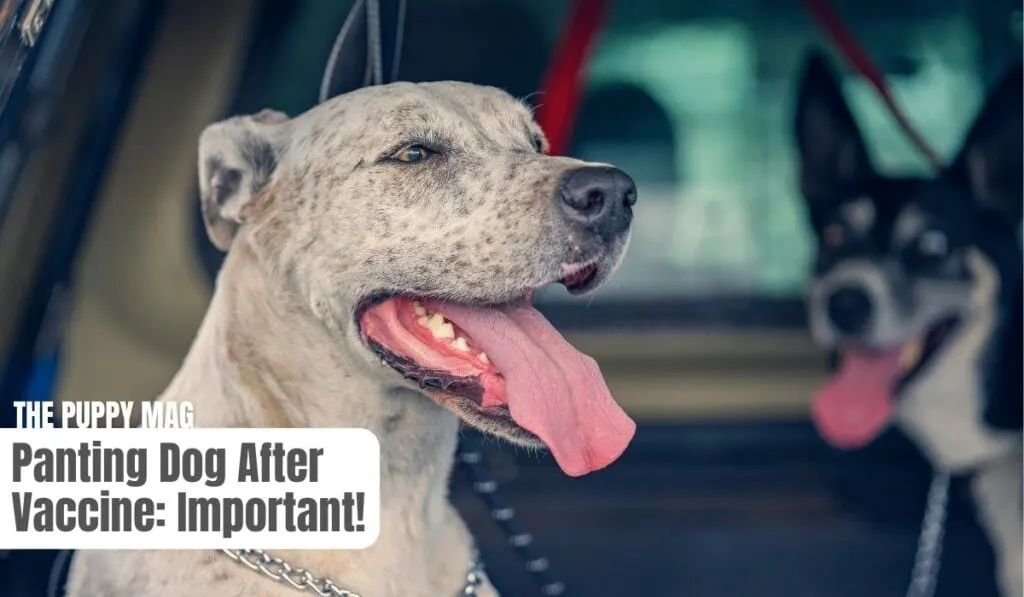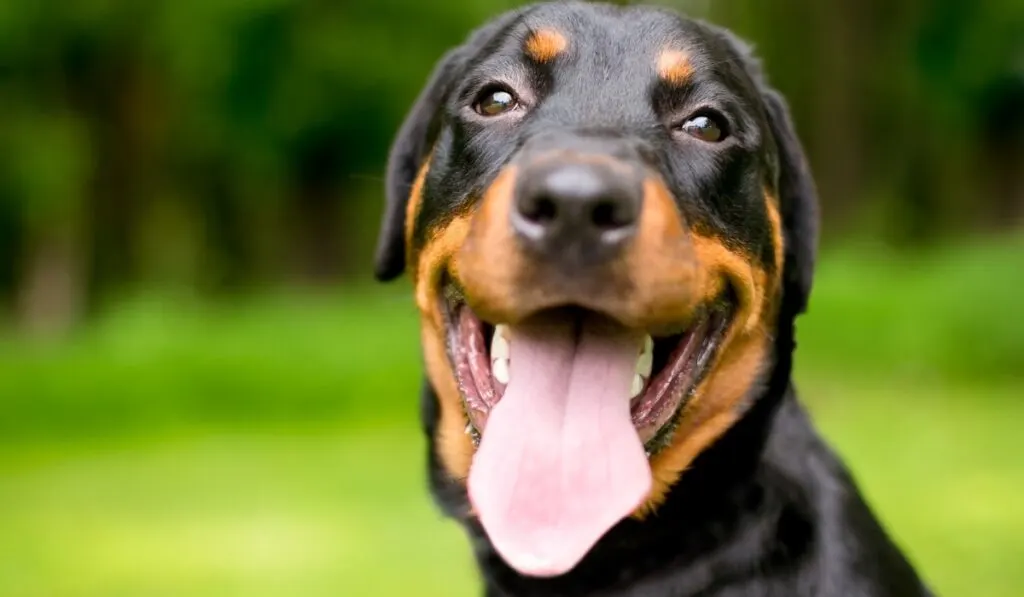Welcome to your comprehensive guide on dogs panting after vaccinations. As loving pet owners, we understand your concern about your furry friend’s well-being. So, let’s dive into the topic together, and remember, knowledge is the first step towards ensuring your pet’s health.

Is It Normal for Dogs to Pant After Vaccinations?
Yes, it’s quite normal for dogs to pant after vaccinations. Panting can be a sign of discomfort or a slight reaction to the vaccine. As PetMD explains, common side effects of vaccines include mild fever, discomfort at the injection site, and mild behavioral changes, such as increased panting.
This happens because vaccines stimulate your dog’s immune system – an important process, but it may also cause some temporary side effects.
However, this does not mean that all panting post-vaccination is normal. Excessive panting, or panting accompanied by other symptoms such as vomiting, diarrhea, or lethargy, could be a sign of a more serious reaction and should prompt a call to your vet.
10 Tips to Calm Down a Dog Panting After a Vaccine
Now that we know some panting after a vaccine can be normal, let’s discuss how to make your dog more comfortable during this time.
1. Provide a Comfortable Environment
Post-vaccination, it’s crucial to provide a peaceful, comfortable environment for your dog. A soft bed, low noise, and dim lighting can help create an atmosphere that promotes relaxation.
This will minimize stress-induced panting and support faster recovery. Regularly check for and eliminate potential stressors, like loud noises or unfamiliar faces, during this time.
2. Keep Your Dog Hydrated
Staying hydrated is important for your dog’s overall health and even more crucial after a vaccine. Encourage your dog to drink plenty of fresh, clean water. This not only helps them cool down if they’re panting but also supports their body’s recovery process.
3. Gentle Massage
A gentle massage can have remarkable calming effects on your dog. Target areas like the back, neck, and belly, where dogs often enjoy being petted.
Be sure to keep the pressure light, and stop if your dog seems uncomfortable. Remember, the goal is to soothe and comfort them during this time.
4. Light Exercise
Engaging in heavy exercise immediately after vaccination is not advisable. However, a light exercise such as a leisurely stroll in your neighborhood might be beneficial.
Exercise can help stimulate blood flow and facilitate the distribution of the vaccine throughout the body, plus it can serve as a distraction for your pet.
5. Use Calming Pet Products
Various calming products for dogs are available in the market today. These include pheromone diffusers, which mimic comforting maternal pheromones, calming pet music specially designed to reduce anxiety, and anxiety wraps that apply gentle, constant pressure to soothe nervous pets.
Before trying these products, consult with your vet to ensure they’re a good fit for your furry friend.
6. Monitor Body Temperature
Keeping track of your dog’s body temperature can help you identify any potential issues early. A slight increase is normal after vaccination, but a high fever might indicate a more serious reaction.
You can use a pet thermometer to monitor your dog’s temperature at home, but make sure to discuss this with your vet first for correct usage.
7. Provide Soft Food
If your dog is showing reduced energy levels or a diminished appetite after their vaccine, offering them soft, easily digestible food can be a good strategy. You might consider adding a bit of low-sodium broth to their food to make it more enticing and easier to eat.
8. Distract Your Dog
Distraction can be a powerful tool to help your dog cope with discomfort. A new chew toy or a gentle game of tug can take their mind off any post-vaccination unease they may be feeling. However, remember to keep any activities low-impact to avoid unnecessary stress or injury.
9. Keep a Regular Routine
Maintaining your dog’s regular routine can provide a sense of security and normalcy during what might be an unsettling time for them. Try to stick to their usual feeding, exercise, and bedtime schedule as much as possible.
10. Give Lots of Love and Reassurance
Nothing comforts a dog more than the love and reassurance of their owner. Spend quality time with your pet, offer gentle strokes, and speak in a soft, calming voice.
Let them know you’re there for them. This emotional support can significantly help in reducing stress and, in turn, panting.

What About When Puppies Pant After Vaccines? (Is The Response Different?)
Puppies, like their older counterparts, can experience side effects after receiving vaccines.
However, as puppies are still growing and their immune systems are still developing, there are a few additional considerations for new puppy owners.
Understand the Vaccination Schedule
Puppies generally begin their vaccines at around 6-8 weeks of age and receive several rounds of vaccinations every 3-4 weeks until they’re about 16-20 weeks old. This schedule is designed to provide immunity to puppies who are losing the protective antibodies they received from their mother’s milk.
Monitor Your Puppy Closely
Because of their developing immune systems, puppies might be more susceptible to reactions from vaccines. It’s important to keep a close eye on your puppy after each round of vaccinations. Look for any changes in behavior, appetite, or energy levels.
Provide Extra Comfort
Post-vaccination, your puppy may feel a little under the weather. Providing a comfortable and warm space for your puppy to rest is important. Make sure they have easy access to water and are encouraged to eat their food.
Be Mindful of Exercise
While it’s important for puppies to have play and exercise for their development, it’s best to have a quieter day planned after vaccinations. This doesn’t mean they can’t play at all, but it might be a good idea to avoid intense activities or playdates with other dogs on this day.
Look Out for Side Effects
While panting can be a side effect of vaccinations, excessive panting in puppies could also be a sign of overheating or overexertion, which puppies are especially susceptible to. If you notice excessive panting, along with other symptoms such as loss of appetite, vomiting, diarrhea, or lethargy, you should contact your vet immediately.
Just like with adult dogs, it’s always best to consult with your vet if you have any concerns about your puppy post-vaccination. They can provide advice tailored to your puppy’s specific needs and circumstances. As always, the health and well-being of your puppy are of the utmost importance, and your vet is your most reliable resource.
What About Giving Antihistamines?
In some cases, antihistamines can be used to help manage minor vaccine reactions in dogs. These medications work by blocking histamine, a compound released by cells in response to an injury or in allergic and inflammatory reactions.
However, it’s crucial to understand that you should never give your dog an antihistamine without first consulting your vet. Antihistamines should be used under veterinary guidance because the dosage must be accurate to avoid potential side effects, and not all types of antihistamines are safe for dogs.
Additionally, using antihistamines preemptively to prevent vaccine side effects is a topic of ongoing debate. While some vets may suggest their use in certain cases, others may not, based on the individual dog’s medical history and the specific vaccine being administered.
If you’re considering using an antihistamine for your dog following a vaccine, it’s critical to have a conversation with your vet beforehand. They can advise you on the best course of action, taking into account your dog’s overall health, age, size, and any pre-existing medical conditions.
Lastly, if your dog is experiencing a severe allergic reaction to a vaccine, such as anaphylaxis, this is a medical emergency that requires immediate veterinary care. In such cases, more potent treatments, such as corticosteroids or epinephrine, may be necessary. This underscores the importance of monitoring your dog closely after vaccination and contacting your vet or an emergency clinic immediately if you notice severe symptoms.
When Should You Contact a Vet?
While minor side effects can be normal, any severe or prolonged symptoms should prompt an immediate call to your vet. According to the American Veterinary Medical Association, severe reactions can include vomiting, diarrhea, difficulty breathing, collapse, or hives. These symptoms might indicate a vaccine reaction known as anaphylaxis, which requires immediate veterinary attention.
Also, if your dog continues to pant excessively for more than 24 hours after receiving the vaccine, or if they appear to be in pain or distress, it’s important to get in touch with your vet as soon as possible.
Remember, you know your pet better than anyone else. If you feel something isn’t right, don’t hesitate to seek professional advice.
Conclusion
In conclusion, it’s important to understand that while some panting after a vaccination can be normal, excessive or prolonged panting may indicate a more serious reaction.
The key takeaway here is to monitor your dog’s behavior closely after vaccinations, know the signs of potential complications, and be prepared to reach out to your veterinarian if necessary.
Your dog’s health and comfort are always the top priority, and understanding their reactions to vaccinations can help ensure you’re providing the best care possible.
Vaccinations are an essential part of preventive healthcare for pets and protect them against serious diseases, so don’t let the potential for minor side effects deter you from maintaining your pet’s vaccination schedule.
Remember, the tips mentioned above can help comfort your dog and alleviate any minor discomfort they may feel after receiving their vaccines. Be patient with your pup, offer them plenty of love and reassurance, and they should be back to their normal selves soon.
As always, in cases of doubt or severe symptoms, consult your veterinarian. They are the best source of information when it comes to your pet’s health. Take good care of your furry friend!
